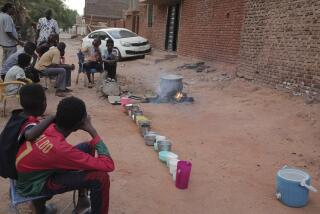To Help Sudanese Children, UNICEF Vets Help Cows
- Share via
THIET, Sudan — Boys hoping for a cow-side consultation flock to UNICEF veterinarian George Were when he clumps into camp in his rubber boots.
In this land where a young man who wants to woo a woman sings that she is as beautiful as his favorite bull, tending a cow is an act of devotion as well as an indication of Dinkas’ dependence on cattle.
“If a child is sick and a cow is sick, they prefer to treat the cow,” said one of Were’s colleagues, Dr. John Okiring, who is with the Belgian aid group Veterinarians Without Borders.
“You can live without a child, but you can’t live without a cow. A cow provides the milk, and if necessary the meat, for a whole family to live.”
Concerned about the welfare of Dinka children, who depend heavily on cows’ milk for nutrition, UNICEF is working to improve animal husbandry in southern Sudan.
Were--whose name is pronounced Wary--works out of the back of a Jeep, dispensing louse powder, antibiotics, de-wormer, tick grease and plenty of advice.
Last year, UNICEF and its partners vaccinated more than 1.1 million cattle in southern Sudan against the deadly and highly contagious rinderpest.
With 10 international and seven local partners, UNICEF is training animal health workers to treat other major diseases, such as anthrax and contagious bovine pleuro-pneumonia.
Herders are charged for the animal services so that they will not be spoiled when the war ends and cross-border trade resumes, Were said. The prices are heavily subsidized by aid agencies, however.
“The charges are accepted because people here love their animals. They’d even pay more,” said a local vet, Angelo Dhol.
More to Read
Sign up for Essential California
The most important California stories and recommendations in your inbox every morning.
You may occasionally receive promotional content from the Los Angeles Times.










